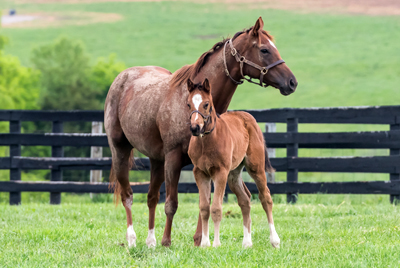No Horsing Around: Business and Tax Planning for the Thoroughbred Industry
by Dr. Leonard (Len) Green, CPA, MBA, The Green Group –
September 25, 2025

Recent tax acts, including the 2025 One Big Beautiful Bill Act (HR1), contain favorable developments for depreciating and expensing yearlings, breeding stock, farm equipment and other property that CPAs and their clients involved in the equine industry should be aware of.
Bonus Depreciation
Common equine assets eligible for bonus depreciation include yearlings, two-year-olds in training, racehorses, broodmares, stallions, equipment, fencing, special-use barns and land improvements. These assets must be used primarily within the United States to stimulate local economic growth.
Under prior tax law, bonus depreciation was gradually ramped down from 100% in 2022 to 40% in 2025 to 20% in 2026 and to 0% in 2027. HR1 restores 100% bonus depreciation, which is now permanent for a qualified property placed in service on or after Jan. 20, 2025. The definition of property qualifying for bonus depreciation includes used property, excluding assets re-acquired by the purchaser.
If the property was acquired in 2024 and placed in service in 2025, it does not qualify. The property also cannot be bought from a related party. Another tax advantage is that bonus depreciation is not limited by taxable income, enabling deductions to create or increase a net loss. This feature could make it more advantageous than Internal Revenue Code (IRC) Section 179 tax depreciation where businesses can deduct 100% of a horse or horse-related assets in the year of purchase; however, there are some limitations. It cannot be used to generate a loss. There are also maximum dollar limitations.
Furthermore, bonus depreciation is not prorated by the purchase date, so assets placed in service at year-end are eligible for the same benefit as those purchased earlier in the year.
To claim bonus depreciation, assets must be “placed in service” within the tax year. Racing prospects can be placed in service when training starts or when they begin racing. Breeding stock can be placed in service when available for breeding or when they are bred.
A common misconception is that paying for an asset means that it is automatically placed in service. Not so. For example, stallion shares bought while the horse is still racing are placed in service only when the horse is ready for breeding. Conversely, assets placed in service but not yet paid for are eligible for bonus depreciation.
For taxpayers purchasing farms, bonus depreciation can apply to certain use barns, land improvements, fencing and equipment. Strategic allocation of the purchase price to these depreciable assets is essential to help maximize deductions, and component depreciation may be advantageous with a cost segregation analysis.
A few months still remain for 2025 asset additions with the potential of bonus deprecation. There is no maximum dollar amount for the bonus deprecation deduction. For those who are members of a partnership, the election is made at the partnership level.
Hobby Losses (IRC §183(B))
Hobby loss rules restrict the deductibility of expenses from activities not engaged in for-profit activities, but the income is taxable. For all other industries, if an activity generates a profit in at least three out of five consecutive years, the IRS presumes the activity to be a business, not a hobby. Unique to horse-related activities (e.g., breeding, showing, training, racing), the rule is two out of seven years. However, even if this rule is met, the IRS can still challenge the for-profit nature of the activity based on other factors.
The IRS objectively conducts a nine-point test to determine if a business is operating with the motive of generating profit. The taxpayer needs to satisfy five of the following factors:
- The expertise of the taxpayer or his or her advisers (including their CPAs)
- The time and effort expended by the taxpayer in carrying out the activity
- The expectation that the assets used in the activity may appreciate in value
- The success of the taxpayer in carrying out similar activities
- The taxpayer’s history of income or loss with respect to the activity
- Expectation of future profit from the activity
- The financial status of the taxpayer and dependence on this income
- Personal pleasure or recreation is not the major factor
- Not changing your business plan
Taking the following proactive steps will help demonstrate the intent to make a profit and satisfy the above tests:
- Conduct the activity in a businesslike manner by keeping contemporaneous records and having a business plan in place.
- Set up a two-person LLC.
- Spend enough time on the craft to demonstrate that the activity is a business, not a hobby (there are 100- and 500-hour tests).
- Hold discussions with trainers, jockeys and other industry-related professionals.
- Attend races, sales and other industry-related activities.
- Hire a tax and accountant advisor who is knowledgeable in the economics and tax aspects of the horse industry.
- After a period, if the original business plan does not look to be headed toward profitability, consider pivoting exclusively from racing to a mix of racing, breeding or buying and selling horses (called pinhooking).
- See if Form 4797 shows a profit which could be combined with any loss from the horse operation.
 | Leonard C. GreenDr. Leonard (Len) Green, CPA, MBA, is chairman and founder of the Green Group. |